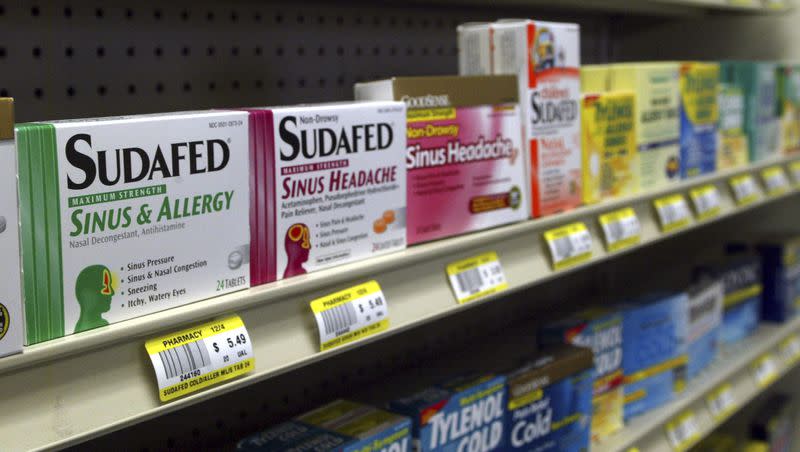FDA panel says common decongestant doesn’t help a stuffy nose

One of the main ingredients in many over-the-counter oral decongestants doesn’t work, according to a U.S. Food and Drug Administration advisory panel. Phenylephrine taken orally, a mainstay in some cold and allergy medications, does not effectively reduce nasal congestion, the group said.
In fact, the Nonprescription Drugs Advisory Committee said, five studies used in the review found phenylephrine no more effective than a placebo.
The FDA on Monday told reporters that phenylephrine is the most-used oral decongestant in the country and brings in about $1.8 billion in sales annually. It’s a key ingredient in many sinus and allergy medications, including some Benadryl, Sudafed, Tylenol, Mucinex, Vicks and other brand products.
The review began in 2007, according to the panel, after scientists challenged whether oral phenylephrine worked. Sixteen years later, the panel voted 16-0 that it does not.
As NBC reported, “The unanimous vote, which specifically declared oral formulations of phenylephrine ineffective, is expected to disrupt the market for OTC cold and allergy remedies, where consumers largely prefer pills over nasal sprays.”
The effectiveness of nasal sprays containing phenylephrine was not called into question.
Oral phenylephrine got a boost in popularity in around 2006 when pseudoephedrine was moved off regular store shelves and behind pharmacy counters because it was being used to make methamphetamine.
Why not just take more?
Safety has not been called into question, but health officials warn against taking more of the products to try to get the wanted effect because they contain other ingredients at a dose that may not be safe if exceeded.
“The group also told the FDA that studying phenylephrine at higher doses was not an option because it can push blood pressure to potentially dangerous levels,” per Associated Press. And NBC noted that headaches, insomnia and nervousness can occur.
The article quoted Dr. Paul Pisaric of Archwell Health in Oklahoma: “I think there’s a safety issue there. I think this is a done deal as far as I’m concerned. It doesn’t work.”
Since some of the other ingredients may help some symptoms, consumers are being told that they don’t need to throw the products away.
What’s next?
“Agency officials generally follow the recommendations of the advisory panels, though not always, and it could take some months before a final decision is made,” The New York Times reported. And the findings could be contested, prolonging any move toward product substitutions or removing certain stock at stores.”
If the FDA follows the advisory panel’s suggestion, it will have to decide whether to order products containing oral phenylephrine to be pulled from store shelves or if it will give companies time to reformulate the products.
Related
The manufacturing industry is already pushing back. The Consumer Healthcare Products Association took issue with the finding that oral phenylephrine doesn’t work, its disagreement outlined in a written statement.
“Oral phenylephrine has been relied upon as a beneficial nasal decongestant by American families for decades, and FDA has repeatedly concluded the ingredient is safe and effective. This determination, established by multiple double-blind, placebo-controlled trials and supported by two previous FDA advisory panels, has also been validated by a meta-analysis of relevant clinical studies,” the group said.
The association noted that 83% of consumers who had used a product containing oral phenylephrine in the last year “agreed the medicines helped relieve their nasal or sinus congestion” and that removing products would put a burden on consumers.
The ‘safe and effective’ standard
The FDA’s standard for an ingredient used in over-the-counter medication is “safe and effective.” It defines effective as “a reasonable expectation that, in a significant proportion of the target population, the pharmacological effect of the drug, when used under adequate directions for use and warnings against unsafe use, will provide clinically significant relief of the type claimed.”
Oral phenylephrine does not meet that standard, the panel said in its 66-page report. It noted possible benefits of changing the drug’s safe-and-effective status, including:
Avoiding unneeded costs and delays in care.
Avoiding side effects and possible allergic reactions to phenylephrine.
Avoiding taking more hoping to get benefits.
Avoiding risk of medication use in children.
Lowering overall healthcare costs.
Avoiding “missed opportunities” to use more effective treatments, including seeing a doctor if you need it.

